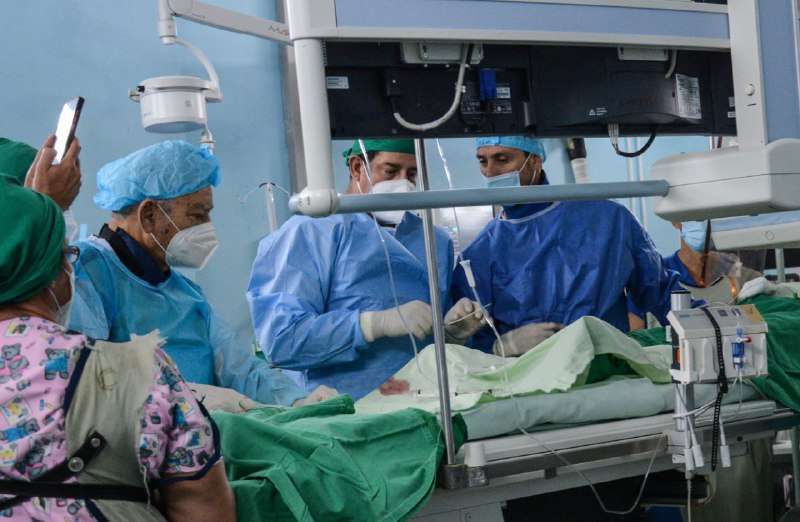Specialists from the Institute of Cardiology and Cardiovascular Surgery of Havana performed this Monday for the first time in Cuba a minimally invasive procedure to implant a percutaneous aortic valve at two patients with severe aortic stenosis, refer official sources.
Dr. Leonardo López Ferrero, interventional cardiologist and head of the Cardiology and Hemodynamics service of that institution, pointed out that for several years the center had developed this surgical replacement, according to a note of Ministry of Public Health (MINSAP).
However, the technique used now avoids the surgery cardiovascular system by conventional route, reduces hospital stay and results in a better quality of life and recovery of patients, as explained by the specialist.
Specialists of the Institute of Cardiology and Cardiovascular Surgery (@CardioDir) performed, for the first time in Cuba, a minimally invasive procedure to implant a percutaneous aortic valve in two patients with severe aortic stenosis.
?https://t.co/LyDvvsf205 pic.twitter.com/emLE7gioXU
— Cuban Ministry of Public Health (@MINSAPCuba) October 31, 2022
The publication points out that the procedures were carried out thanks to the donation of the devices by the European company Iberhospitex SA, since between the valve, which in this case comes from India, and the equipment necessary for its execution, the cost is around 60,000 euros.
With the application of these prostheses, the specialists aspire to gradually start a transcatheter aortic valve implantation (TAVI) program on the Island. The procedure would be applied to people who meet the electrocardiographic, echocardiographic, and angiographic criteria. and tomographic established and that have cardiac surgery contraindicated, explained López Ferrero.
Regarding the novel technique, the doctor specified that the patient receives light sedation and approaches are made through the femoral and radial arteries. In this way, a catheter is taken to the narrow aortic valve and the new valve (from bovine pericardium), which is mounted on a stentreplaces the sick.
On this first occasion, this technique was carried out as part of a practical workshop for professionals of the Institute, which will later be transmitted to interventional cardiologists in the country, assured Dr. Carmen Rosa Martínez Fernández, director of the center.
In addition, he explained that this is an important procedure for Cuba in the midst of a context of population aging, since degenerative aortic stenosis has a prevalence in the population over 65 years between 4 and 7%.
Of the total number of diagnosed cases, around 30% do not undergo surgery due to contraindications to surgical treatment and associated comorbidities, the note highlights.
According to the data handled by the Ministry of Health, the mortality of patients with severe aortic stenosis is 50 to 60% in the first two or three years after diagnosis if no intervention is performed. Taking these figures into account, the TAVI constitutes a line of development for the entity and for Cuba, said Martínez Fernández.
According to the note, the procedure was carried out by a multidisciplinary team made up of cardiologists from the William Soler Institute and Cardiocenter, cardiovascular surgeons, sonographers, imaging specialists, anesthesiology specialists and nursing staff, and was accompanied by doctor Ignacio Amat Santos, head of Hemodynamics and Interventional Cardiology at the University Clinical Hospital of Valladolid, in Spain.
The visiting expert said that these prostheses began to be developed in the 2000s due to the complications that some patients presented through the conventional route for surgery and something less invasive and that would enable faster recovery was considered.
Santos added that in Spain between 4,000 and 5,000 procedures of this type are carried out each year in various hospitals. “There is experience in the world, but only recently did research show that this option was better for patients with low risk for open surgery, hence the attempt to generalize it worldwide,” he said.





